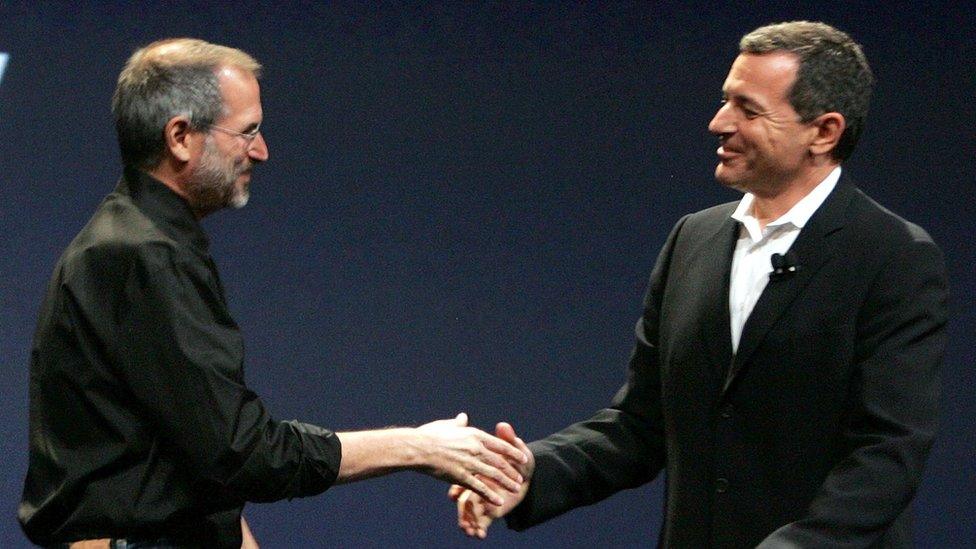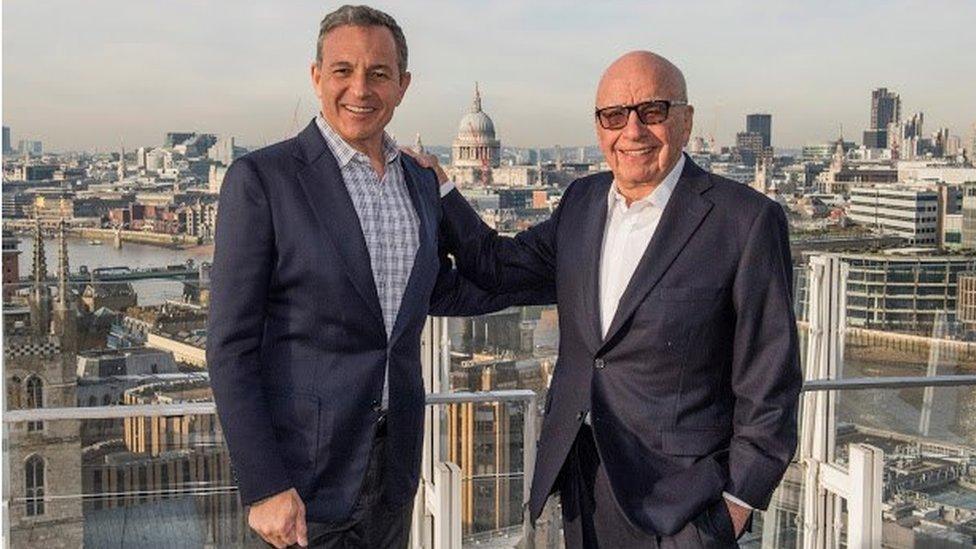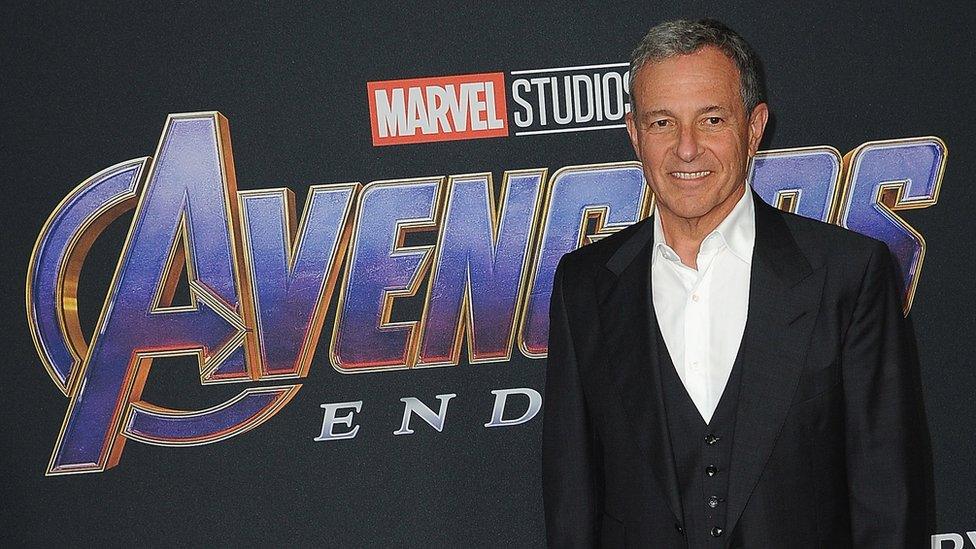The Bob Iger method
- Published
Disney's Bob Iger defends Marvel and reveals how he clinched and walked away from some of the biggest deals in history
It is customary in most examinations of a CEO's tenure to highlight errors and missed opportunities, find competitors who will bad mouth said individual, and, when it comes to those who lead global corporate giants, question whether any financial successes have been justly shared, within the company and across wider society.
To immerse yourself in coverage of Bob Iger is to find journalists struggling and generally failing on all three fronts. Mr Iger's reign at The Walt Disney Company does present challenges to even the most sceptical of journalists. He has overseen a series of blockbuster acquisitions; Disney's growth has been consistent, vast (and record-breaking, for instance when it comes to the latest box office success of his Marvel franchise); and scandal has for the most part been absent.
Mr Iger, who isn't yet done with running Disney, but says he has ruled out running for US President, is widely lauded as both the most powerful man in Hollywood/global media outside of Big Tech (delete as appropriate), and a reassuring, modern personification of the American dream.
Such adulation demands that anyone scrutinising him put extra emphasis on missteps and failings. In his only recent UK interview, I sat down with him for over an hour for BBC Radio 4's The Media Show, and put four criticisms to him. First, why the delay in launching a direct-to-consumer streaming service? Second, was Martin Scorsese right about the creative homogeneity of Marvel productions? Third, does the differential in pay between him and junior staff (or "cast members") at Disney undermine the case for capitalism? Fourth, are he and Disney compromised by doing business in China?
He had answers to all, of course. Before getting into them, it's worth elucidating the method and strategy that has made him undoubtedly one of the most effective CEOs in media history. I call it Igerism.
To my mind, Igerism is strategic simplicity, exceptional charm, and shameless ambition.
Riding into the future
That's the short version. There is a much longer version in Iger's book, The Ride of a Lifetime, which I hesitate to admit is actually very interesting. Most leadership manuals by self-appointed corporate moral crusaders are unreadable tosh; the Iger book has several news lines, including about his relationships with Steve Jobs and Rupert Murdoch, and plenty of mischief, including quite cutting detail on Hollywood egos such as the super-agent Michael Ovitz, who once stood between Iger and the top job at Disney.
Iger's shameless ambition pertains to both his own career and his company's. As a boy done good from the East Coast, he rose to become one of America's top TV executives in his 30s (his book is full of praise for key mentors). He then faced a challenge: how to replace the legendary Michael Eisner as boss, when what Disney needed was major overhaul and he had been Eisner's deputy for five years. Iger had to cast himself as an agent of change despite being a consummate insider.
He did it by explaining the changes he wanted to make. Crucially, as someone from an ordinary background, he never felt he needed to apologise for wanting to get on in life, a sentiment I wish I could have included in a documentary I made about social mobility.
After getting the job, strategic simplicity kicked in. It really is remarkable how uncomplicated Iger's approach to business growth is. He identifies weaknesses and neutralises them. And then he pursues scale and power to squash competitors, often by buying them. He looks at the underlying trends in a sector, and rides them.

Apple CEO, Steve Jobs, sold his animation company Pixar to Disney in 2006, in a deal worth $7.4bn
In several blogs on this page I have written about how modern media is shaped by the marriage of content with frictionless distribution. For the past 15 years, Iger's strategy has been to acquire more and more and more content. He distinguishes Disney's forthcoming streaming service from Netflix by casting the latter as a volume player. They have loads and loads and loads of content, and have tried to become your entire viewing companion, with something for all the family such that you don't need to bother with other services.
Disney+ (or Iger+, as I call it) will be different, because of its assortment of mega brands - what Iger calls high-quality, branded entertainment. Owning those brands is the content side; getting them to consumers in the most frictionless and convenient way possible is the other side of it. I put to Iger that he, and Disney, were late to the game with a streaming service. You can make your own mind up on his answer, in which he broadly says you need both the content and the technology, and that takes time.
The other trend in media is globalisation, of course. If you own the IP on some TV or film, you want to sell that in as many places as possible. It helps if they are world-famous brands (Marvel, Star Wars, Mickey Mouse); and it also helps if the nature of their stories is universal rather than local (superheroes, sci-fi, kid's cartoon characters, in those three cases).
So with Disney+, which will provide something like the culmination of Iger's career, you see the unification of these three trends: a vast library of content, the frictionless-ish distribution of a direct-to-consumer offer, and story-telling with appeal from Boston to Beijing.
Protect the brand
Of all the brands that Iger has sought to nurture, none matter to him more than Disney itself. Here again his strategy was simple. When he took over, Disney's animation division was weak. He stripped Disney to its basics: what did the company traditionally do best? Answer: stories kids love. So he presented, in stark terms, the crisis in the animation division to his board. This persuaded them to loosen the purse strings and go for Pixar.
Next, what are companies like Disney in the business of doing, ultimately? Providing joy through stories. They're not alone in this, of course: when I interviewed Ted Sarandos of Netflix, he distinguished his company from the BBC not only through reference to the regulation faced by the latter, but by saying that the reason Netflix doesn't do news is that it's basically a joyful place. And news isn't.
This is also why Iger chose not to buy Twitter. He had gone a long way down the line with Jack Dorsey of Twitter, who used to be on Disney's board. But as he explained to me, the complexity of the deal would have been distracting; and as he has said in other interviews, the "nastiness is extraordinary", external
According to Igerism, when nurturing brands, distil them to their essence, and to the extent possible allow nothing to damage that essence. It is obvious in retrospect that Twitter does not fit with a company whose aim is to provide joy through stories.
Despite this, he has done business in China. This was clearly a sensitive subject during the interview (and after it). The theme park he opened in Shanghai, after several dozen long-haul flights, was clearly a huge commercial gambit and, now success. Disney has obligations to its staff, known as cast members, which may at some point become impossible to reconcile with certain working practices in a country ruled according to socialism with Chinese characteristics. For now, the commercial gain has outweighed any reputational damage. But constant vigilance is the price.
His own price - the salary he takes from Disney - has been the subject of controversy. Abigail Disney, a relation of Walt who has no direct involvement in the company, was outspoken about it, while praising Iger's leadership. In crude arithmetic terms, the board of Disney believe he has more than earned his salary, $66m in a recent year. The broader question, of whether such a differential between the boss and those starting out at the bottom, as he once did, undermines the case for capitalism, is one I put to him. You can make up your own mind about his answer.
Charm (in)offensives
Much has been said and written by other interviewers, not least Oprah Winfrey, about Iger's integrity and reputation for decency. The quotes in Maureen Dowd's New York Times interview, from some of Hollywood's biggest names (David Geffen, Barry Diller), are gushing.

Bob Iger and Rupert Murdoch after agreeing the sale of 21st Century Fox to Disney
As corporate strategy, his inter-personal skills have been exceptionally valuable. Steve Jobs had a toxic relationship with Eisner, and Disney; Iger charmed him, then bought his company. George Lucas was quite understandably very protective of his blockbuster creations. Iger charmed him, then bought his company. Ike Perlmutter of Marvel was notoriously one of the most eccentric and inaccessible CEOs on the West Coast. Iger charmed him, then bought his company.
And very, very few people knew or thought Rupert Murdoch was prepared to sell the entertainment behemoth he spent decades building. Iger charmed him, then bought his company.
In any reflection on Iger's leadership of Disney, it would be remiss to overlook the fact that his personal relations with a series of titanic egos - who between them had very different dispositions and politics - has been highly effective.
Succession
Talking of which, when I spoke to him, Iger had just started watching Succession, the American drama about a media mogul's family that is one of the greatest TV shows ever made. He was very into it, and having put off his own retirement several times, will know that a succession plan for Disney will be high on his priority list, once Disney+ has rolled out.
It is a tough act to follow. Iger's career has connected two very different golden ages in our screen culture. Igerism offers a template for how to make a mouse roar.
The full-length interview with Bob Iger is available via The Media Show on BBC Sounds: Making the Mouse Roar. A shorter TV version for BBC News and BBC World will be broadcast over the weekend of 8th November and then available on the BBC iPlayer.
- Published2 November 2019

